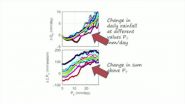(Press-News.org) The use of antidepressants during pregnancy has no long term neurodevelopmental or behavioural effects on the child, however they may be associated with an increased risk of postpartum haemorrhage, suggests the findings from three studies published in BJOG: An International Journal of Obstetrics and Gynaecology (BJOG).
Depression and anxiety are the most common mental health problems during pregnancy, with around 12% of women in the UK experiencing depression at some point during pregnancy and the postnatal period. The use of antidepressants such as selective serotonin reuptake inhibitors (SSRIs) to treat depression during pregnancy has become increasingly common, however, it is unclear whether any increased risk to the fetus, and health problems for the woman or baby, can be attributed directly to these drugs or may be caused by other factors. The research published today examines the effects SSRI use on the health of both the mother and the long term development of the child.
A study from the Norwegian Institute of Public Health looked at the effects of prenatal exposure to SSRIs on motor skill development at 3 years old in 51,404 children from the Norwegian Mother and Child Cohort Study. In this cohort 159 mothers reported a prolonged use of SSRIs during pregnancy. Their children had a slight delay in the development of fine and gross motor skills compared to children unexposed during pregnancy. However, the authors of this paper acknowledge that the numbers are so small, no change in clinical practice is warranted.
Marte Handal, lead author of the study from the Norwegian Institute of Public Health said:
"Our results show that treatment with SSRIs during longer time periods in pregnancy was weakly associated with a delayed motor development at age three. However, only a very small number of children had a severe delay. Even though we did take into account maternal symptoms of depression we still did not have complete information on the severity of the maternal depression in the different groups. Effective treatment of depression during pregnancy is essential and these results should not discourage healthcare professionals from prescribing or continuing antidepressant treatment to those who need it."
In another study, an Australian team analysed data from 49,000 women registered on the Danish National Birth Cohort, to examine the impact of prenatal exposure to SSRIs on behavioural problems at aged 7. Results found that untreated prenatal depression (231 children) was associated with an increased risk of problem behaviour in the children, hyperactivity, inattention, and peer problems. This increased risk was not seen in the children (210 children) whose mothers took antidepressants, including SSRIs.
In a separate study, the same team examined the risk of postpartum haemorrhage (the loss of between 500 to 1,000ml of blood within the first 24 hours after giving birth) in mothers taking antidepressants in the final three months of their pregnancy, at the Women's and Children's Hospital in Adelaide, Australia. For women without psychiatric illness (28,000 women) or who were not taking antidepressants (1,292) the risk of postpartum haemorrhage was 11%. This increased to 16% for women taking antidepressants (558). Risk of severe postpartum haemorrhage and of postpartum anaemia were almost doubled by SSRI use.
Dr Luke Grzeskowiak, lead author of the studies from The University of Adelaide, Australia, said:
"It is reassuring to find that prenatal exposure to antidepressants did not affect a child's behaviour at age 7, however as with any medication, the benefits and risks but always be considered.
"Regarding our other study, overall the risks for postpartum haemorrhage are largely unknown. We found separate increases in risk with placenta praevia, prolonged labour, hypertension and assisted vaginal delivery, as well as the increased risk seen with antidepressant use. However we did not have data on known risks such as use of oxytocin during delivery, nor did we have any data on the severity of the underlying maternal psychiatric illness. Consequently, it is possible that the women who took antidepressants late in pregnancy were those with the most severe illness and it is this which is responsible for the increased risk of postpartum haemorrhage and not the antidepressant. Based on this study alone we do not recommend that women stop taking medication for depression during pregnancy, but are closely monitored in order to reduce the risk of any potential increased risk of bleeding as much as possible."
John Thorp, BJOG Deputy Editor-in-chief said:
"These studies add to a growing body of evidence about the safety of taking antidepressants during pregnancy. While there are some increased risks, the evidence so far seems to be that the risks of untreated depression outweigh the risks of taking them. But the more we understand the better prepared the medical profession will be to help women through their pregnancy and birth."
Royal College of Obstetricians and Gynaecologists response to BJOG studies on SSRI use in pregnancy
Dr Patrick O'Brien, a maternal mental health expert and spokesperson for the Royal College of Obstetricians and Gynaecologists (RCOG), said:
"The decision whether or not to use SSRIs during pregnancy must be considered on an individual basis as untreated maternal depression can itself be harmful. Pregnant women and mothers can be reassured from these studies which suggest there are no clinically important long term neurodevelopmental or behavioural problems associated with taking SSRIs.
"While it is useful for women to be aware that SSRI use may increase the risk of postpartum haemorrhage, more research needs to be done to understand what is behind this increased risk. Women should not stop taking their medication without first discussing their options with their doctor and if necessary extra precautions can be taken to prevent postpartum haemorrhage at the time of birth."
INFORMATION:
Stanford University School of Medicine researchers and their colleagues are calling for an urgent re-evaluation of global guidelines for the treatment of parasitic-worm diseases in light of a new study showing that large-scale treatment programs are highly cost-effective.
Parasitic-worm diseases afflict some 1.5 billion people in the developing world, causing gastrointestinal problems, anemia, wasting, and cognitive and growth deficits in children, and in some cases, liver, bladder and intestinal problems that can be fatal. About 150,000 people die of complications from ...
CANCER RESEARCH UK scientists have found how cells adapt to overcome cancer drugs designed to interfere with their genetic controls, according to a study* published today (Wednesday) in Epigenetics and Chromatin.
Normally molecular 'tags' are attached to DNA which send signals to the cell, telling it how to package its DNA and switch genes on or off.
Drugs called HDAC inhibitors cause a build-up of certain types of tags, leading to potentially damaging changes in gene activity that can kill cancer cells.
But while HDAC inhibitors can successfully treat certain types ...
An accidental find of a collection of young red dwarf stars close to our solar system could give us a rare glimpse of slow-motion planet formation.
Astronomers from The Australian National University (ANU) and UNSW Canberra found large discs of dust around two of the stars, tell-tale signs of planets in the process of forming.
"We think the Earth and all the other planets formed from discs like these so it is fascinating to see a potential new solar system evolving," said the lead researcher Dr Simon Murphy, from the ANU Research School of Astronomy and Astrophysics.
"However, ...
New research at the University of Warwick with colleagues from the London School of Economics has identified changes in the shape of rainfall across Europe; changes in the amount of drizzle compared with downpours and everything in-between.
Professor Sandra Chapman of the University of Warwick and co-authors Professor Nicholas Watkins and Dr David Stainforth from the London School of Economics have today published new research demonstrating how the variability in the way it rains makes it intrinsically difficult to identify the character of local climate change. Difficult ...
HANOVER, N.H. - Warming temperatures are causing Arctic mosquitoes to grow faster and emerge earlier, significantly boosting their population and threatening the caribou they feast on, a Dartmouth College study finds.
The study predicts the mosquitoes' probability of surviving and emerging as adults will increase by more than 50 percent if Arctic temperatures rise 2 °C. The findings are important because changes in the timing and intensity of their emergence affect their role as swarming pests of people and wildlife, as pollinators of tundra plants and as food for ...
A total ban on trans fatty acids (trans fats) in processed foods in England could potentially prevent or postpone about 7,200 deaths from coronary heart disease over the next five years, suggest experts in The BMJ this week.
They say a total ban in England is "technically feasible" and they call for "decisive action" to prioritise the most effective and cost effective policy options.
Industrial trans fatty acids are produced from plant oils (a process known as hydrogenation) and are commonly added to processed foods to cheaply improve shelf life and palatability.
Higher ...
Public Health England (PHE) recently endorsed the use of electronic cigarettes as an aid to quitting smoking. But in The BMJ this week, experts question the evidence on safety and effectiveness underpinning the recommendations.
Professor Martin McKee at the London School of Hygiene & Tropical Medicine and Professor Simon Capewell at the University of Liverpool, argue that the available evidence about e-cigarettes "suggests that the debate is far from over and questions remain about their benefits and harms."
The PHE report concludes that e-cigarettes are much safer ...
The reason why middle class people are more likely to play music, paint and act has been revealed in a major new study.
Research involving 78,000 people found that it was not wealth or social status that were strongly linked to people taking part in arts activities as amateurs or professionals.
Instead, it was the level of education that lay behind arts participation, the study by Dr Aaron Reeves, a sociologist at the University of Oxford, found.
In an article in the journal Sociology, Dr Reeves said that of the 78,011 surveyed, 18% had taken part in painting or ...
A study of 6467 children from England--presented at this year's annual meeting of the European Association for the Study of Diabetes (EASD) in Stockholm--shows that no access to a garden at age 3-5 years is linked to an increased risk developing obesity by age 7 years. The research is by Annemarie Schalkwijk, VU University Medical Centre, Amsterdam, the Netherlands, and colleagues.
Overweight and obese children are at increased risk of becoming overweight and obese adults and therefore being overweight or obese in childhood is an important risk factor for developing ...
A meta-analysis of 21 studies presented at this year's annual meeting the European Association for the Study of Diabetes (EASD) shows that exposure to pesticides is associated with increased risk of developing diabetes by 61%, with different types of pesticides showing varying levels of risk. The study is by Giorgos Ntritsos, University of Ioannina, Greece, and Dr Ioanna Tzoulaki and Dr Evangelos Evangelou, Imperial College London, UK, and colleagues.
How diabetes develops is considered to be an interplay between genetic and environmental factors. Emerging evidence suggests ...


